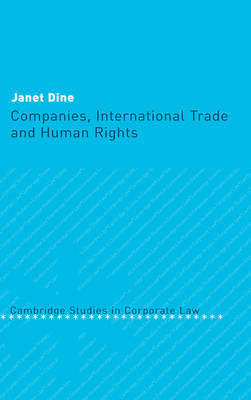
Companies, International Trade and Human Rights
Seiten
2005
Cambridge University Press (Verlag)
978-0-521-82861-1 (ISBN)
Cambridge University Press (Verlag)
978-0-521-82861-1 (ISBN)
This book, originally published in 2005, considers the role of corporations within the trading system, including actions of corporations and their motives. The book assesses remedial devices such as Codes of Conduct and Human Rights instruments, seeking reasons for the failure of trade to reduce poverty, and considers the role of companies in globalisation.
Originally published in 2005, this book focuses on the role of corporations within the trading system, and the complex relationships between corporations, nation states and international organisations. The actions and motives that drive corporations are considered as well as the structure of the international trading system. Remedial devices such as Codes of Conduct and Human Rights instruments are assessed for effectiveness. The book seeks reasons for what is a growing understanding that international trading regimes are not meeting objectives found in many international agreements, including both the international trade agreements themselves (WTO, GATT, TRIPS etc.) and human rights instruments. In particular, it is clear that the prevalence and severity of poverty is not being adequately addressed. This work sets out to investigate the role played by companies in this failure in the globalisation of trade to realise its aims, in particular the failure to achieve the minimum of basic rights, the right to food.
Originally published in 2005, this book focuses on the role of corporations within the trading system, and the complex relationships between corporations, nation states and international organisations. The actions and motives that drive corporations are considered as well as the structure of the international trading system. Remedial devices such as Codes of Conduct and Human Rights instruments are assessed for effectiveness. The book seeks reasons for what is a growing understanding that international trading regimes are not meeting objectives found in many international agreements, including both the international trade agreements themselves (WTO, GATT, TRIPS etc.) and human rights instruments. In particular, it is clear that the prevalence and severity of poverty is not being adequately addressed. This work sets out to investigate the role played by companies in this failure in the globalisation of trade to realise its aims, in particular the failure to achieve the minimum of basic rights, the right to food.
JANET DINE is Professor of Law at the University of Essex and a Senior Visiting Fellow at the Institute of Advanced Legal Studies, London.
Preface; Table of statutes, agreements, covenants and treaties; Table of cases; List of abbreviation; 1. A global crisis?; 2. Why we are here; 3. The institutional framework; 4. Relationship between Companies and Human Rights Law; 5. Corporate social responsibility; 6. Understanding property rights: companies, states and the duty of international co-operation; Bibliography; Index.
| Erscheint lt. Verlag | 24.2.2005 |
|---|---|
| Reihe/Serie | Cambridge Studies in Corporate Law ; Vol.4 |
| Verlagsort | Cambridge |
| Sprache | englisch |
| Maße | 161 x 236 mm |
| Gewicht | 715 g |
| Themenwelt | Recht / Steuern ► EU / Internationales Recht |
| Recht / Steuern ► Öffentliches Recht ► Völkerrecht | |
| Wirtschaft ► Betriebswirtschaft / Management ► Unternehmensführung / Management | |
| ISBN-10 | 0-521-82861-9 / 0521828619 |
| ISBN-13 | 978-0-521-82861-1 / 9780521828611 |
| Zustand | Neuware |
| Haben Sie eine Frage zum Produkt? |
Mehr entdecken
aus dem Bereich
aus dem Bereich


